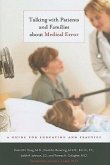Medical visits are often less effective and satisfying than they would be if doctors and patients better understood the communication most needed for attainment of mutual health goals. Here, professors and Johns Hopkins University and Harvard Medical School join forces to help us understand this vital issue, and the means to best facilitate communication that brings more effective medical care and happier, healthier consumers. The verbal and nonverbal exchanges that take place between doctor and patient affect both participants, and can result in a range of positive or negative psychological reactions--including comfort, alarm, irritation, or resolve. "Talk," on verbal, non-verbal and withholding levels, is shown by extensive research to have far-reaching impact.
The verbal and nonverbal exchanges that take place between doctor and patient affect both participants, and can result in a range of positive or negative psychological reactions-including comfort, alarm, irritation, or resolve. This updated edition of a widely popular book sets out specific principles and recommendations for improving doctor-patient communications. It describes the process of communication, analyzes social and psychological factors that color doctor-patient exchanges, and details changes that can benefit both parties. Medical visits are often less effective and satisfying than they would be if doctors and patients better understood the communication most needed for attainment of mutual health goals. The verbal and nonverbal exchanges that take place between doctor and patient affect both participants, and can result in a range of positive or negative psychological reactions-including comfort, alarm, irritation, or resolve. Talk, on both verbal and non-verbal levels, is shown by extensive research to have far-reaching impact. This updated edition of a widely popular book helps us understand this vital issue, and facilitate communications that will mean more effective medical care and happier, healthier consumers. Roter and Hall set out specific principles and recommendations for improving doctor-patient relationships. They describe the process of communication, analyze social and psychological factors that color doctor-patient exchanges, and detail changes that can benefit both parties. Here are needed encouragement and principles of action vital to doctors and patients alike. far-reaching impact.
Hinweis: Dieser Artikel kann nur an eine deutsche Lieferadresse ausgeliefert werden.
The verbal and nonverbal exchanges that take place between doctor and patient affect both participants, and can result in a range of positive or negative psychological reactions-including comfort, alarm, irritation, or resolve. This updated edition of a widely popular book sets out specific principles and recommendations for improving doctor-patient communications. It describes the process of communication, analyzes social and psychological factors that color doctor-patient exchanges, and details changes that can benefit both parties. Medical visits are often less effective and satisfying than they would be if doctors and patients better understood the communication most needed for attainment of mutual health goals. The verbal and nonverbal exchanges that take place between doctor and patient affect both participants, and can result in a range of positive or negative psychological reactions-including comfort, alarm, irritation, or resolve. Talk, on both verbal and non-verbal levels, is shown by extensive research to have far-reaching impact. This updated edition of a widely popular book helps us understand this vital issue, and facilitate communications that will mean more effective medical care and happier, healthier consumers. Roter and Hall set out specific principles and recommendations for improving doctor-patient relationships. They describe the process of communication, analyze social and psychological factors that color doctor-patient exchanges, and detail changes that can benefit both parties. Here are needed encouragement and principles of action vital to doctors and patients alike. far-reaching impact.
Hinweis: Dieser Artikel kann nur an eine deutsche Lieferadresse ausgeliefert werden.







